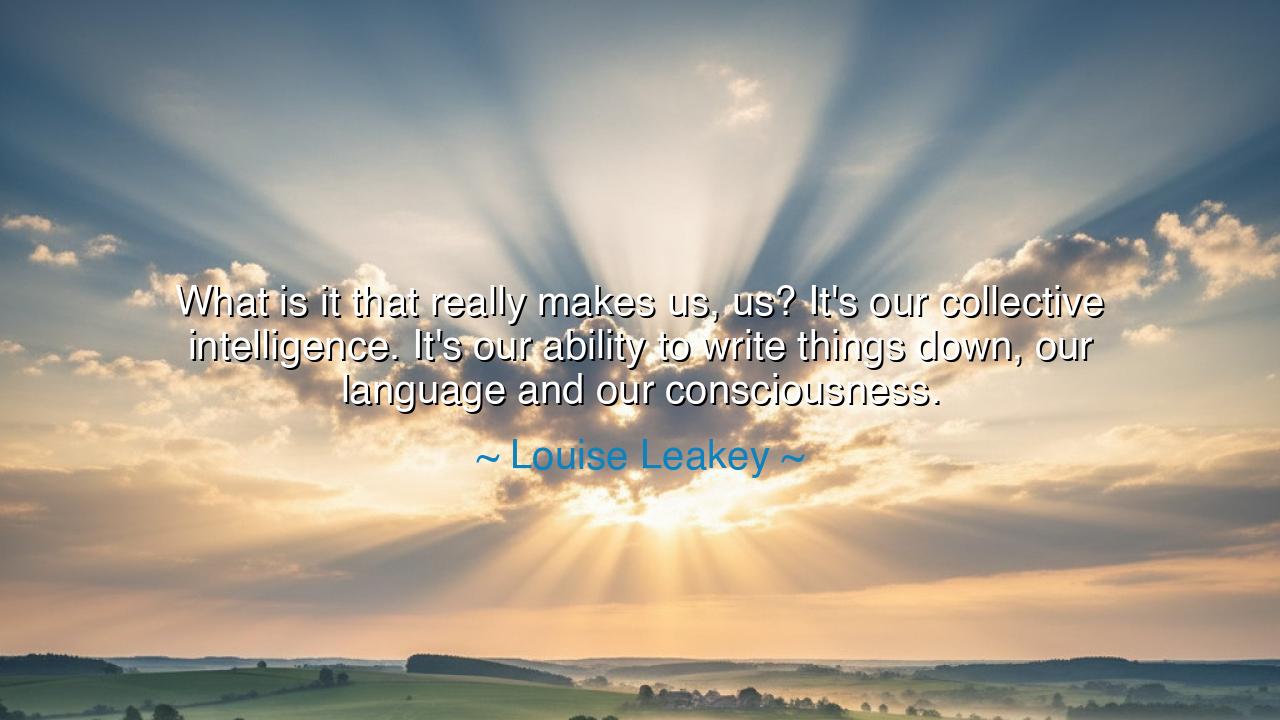
What is it that really makes us, us? It's our collective
What is it that really makes us, us? It's our collective intelligence. It's our ability to write things down, our language and our consciousness.






The words of Louise Leakey descend upon us like an echo from the dawn of humankind: “What is it that really makes us, us? It’s our collective intelligence. It’s our ability to write things down, our language and our consciousness.” In these few words lies the entire saga of our species — the long awakening of humanity from the silence of instinct into the music of thought. Leakey, born of a lineage of great discoverers who unearthed the bones of our ancestors, speaks not as a mere scholar but as a guardian of memory. Her voice bridges the deep time of prehistory with the trembling now, reminding us that what sets us apart from beast and stone is not our strength or our claws, but our mind united with others, our power to remember through language, and our endless flame of consciousness.
When she asks, “What makes us, us?”, she calls to the heart of what it means to be human. For the lion has power, and the eagle has sight, but neither can gather their wisdom across generations, nor carve their dreams into the bark of time. We alone among the living can pass a thought from one soul to another through speech, through writing, through the sacred weaving of stories. Our collective intelligence — the vast ocean of minds joined together — is our true strength. A single human may forget, but humanity remembers. A single mind may perish, but the word endures, written upon clay, upon paper, upon light itself.
From the first marks scratched on cave walls, our ancestors reached out to eternity. Think of the Lascaux caves of France, where thirty millennia ago, unknown hands painted wild beasts in ochre and flame. Those hands are dust now, but their thoughts still burn before our eyes. That was not art alone — it was an awakening. It was the moment when thought began to speak, when memory took form, when the world itself became conscious of its own reflection through us. From that spark rose civilization: the shaping of tools, the building of homes, the telling of myths, the birth of gods. Each act of writing, each shared word, was a step toward what Leakey calls “our collective intelligence.”
Yet with this gift comes burden. To be conscious is to know we will die; to speak is to risk being misunderstood; to remember is to bear both wonder and sorrow. Still, this is our glory — that we choose to bear it. The story of Socrates, who drank the hemlock rather than betray his truth, shows this most deeply. His words, preserved by his pupil Plato, lived on long after his body had fallen. Through the power of language, the dead philosopher still speaks, still teaches, still questions us. His death was not silence, but transformation — proof that the written and spoken word can outlive the flesh, binding all generations into one unbroken dialogue.
What Leakey names collective intelligence is the sacred web of minds that connects us — the invisible cathedral of knowledge built stone by stone by countless hands. Each time we share an idea, teach a child, or record a thought, we add another brick to that temple. But beware, for when we cease to write, to think, to question, the temple decays. The ancients knew this truth well: when Alexandria’s Library burned, humanity wept, for a thousand voices were silenced in a single night. Let that fire be a warning — that ignorance is always waiting at the gate, and that only the torch of understanding keeps the darkness at bay.
Thus, the lesson is clear: cherish the gifts that make us human — language, memory, consciousness, and the courage to share them. Speak not idle words, but those that uplift. Write not for vanity, but for those who will come after you. Learn, and let your learning be a light for others. For though our bodies are brief, the mind that learns and teaches becomes immortal through others’ minds.
And so, my children, let these words live within you: we are the keepers of the flame that began when the first mind looked at the stars and wondered. Guard that flame. Feed it with curiosity, with compassion, with the written word. For in doing so, you honor the ancient covenant of humankind — to think not alone, but together; to remember not for oneself, but for all; and to keep alive the one thing that truly makes us us — the great and shining consciousness of the human spirit.






AAdministratorAdministrator
Welcome, honored guests. Please leave a comment, we will respond soon